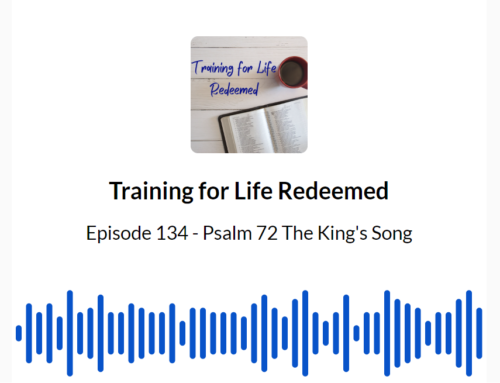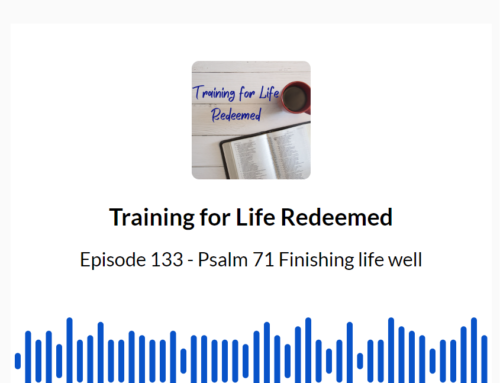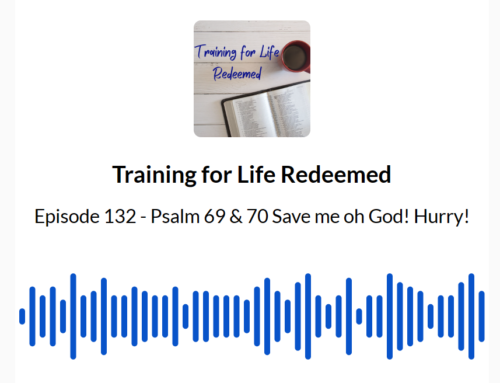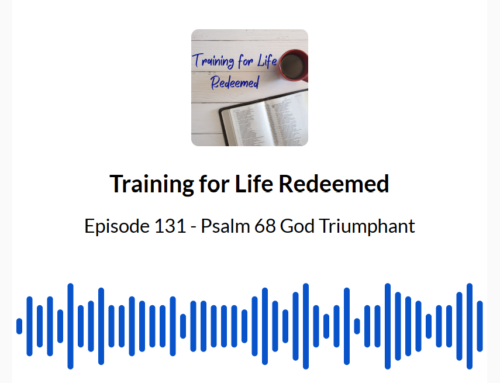Grab your notes for this episode by completing the form
and we will send you the link to all our notes.
We believe God’s words are faithful and true. It is still a shock when we see those words in action. When faith becomes experience, the heart explodes with relief and joy. We want everyone to see what God has done for us.
Dan: (00:00)
Hi everyone and welcome to Training for Life Redeemed. I am Dan talking with my father, David Jackson. We’re working our way through Psalms. Today we’re up to Psalm 48,
David: (00:10)
0 A song A musical composition of the sons of Korah. 1 Great is Yahweh and supremely praised. In the city of our God, the Mountain of his holiness. 2 Beautiful height, the joy of the whole earth, Mount Zion. The side of the north [Zaphon], Town of a great king. 3 God is in her citadel. It will be known as a fortress. 4 For look, the kings congregate. They pass together. 5 They themselves see, Therefore they are astounded. They are disturbed. They panic. 6 Trembling grabs them there; Writhing as if giving birth. 7 With the east wind you shatter ships of Tarshish. 8 As we hear, so we see, In the city of Yahweh of armies, in the city of our God. God establishes her forever. Selah 9 We think about your covenant faithfulness, God. It is inside your palace. 10 According to your name, God, so is your praise to the ends of the earth. Your right hand is full of justice. 11 Let Mt Zion rejoice. Be excited daughters of Judah, on account of your judgements. 12 Go around Zion, and circle her. Count her towers. 13 Set your heart on her fortress. pass between her citadels. so that you can tell the following generation. 14 For this is God, our God forever, until he himself guides us over death.
Dan: (01:36)
Psalm 48. We are still footing in that context of Sennacherib, coming to attack Jerusalem, Jerusalem, then surviving Sennacherib, all like dying overnight and running away and fleeing and all the rest of it, which works really well for this psalm. Because this psalm is basically just about how God protects his city, how God is in the city, and therefore nothing can come in. How other city kings come and they see it and then they panic and they’re trembling and they run away scared. , you have God smashing ships as they try and sail down in the Mediterranean, because it’s the city of Yahweh and he has hosts or armies, right? I think people forget that the God of hosts means he’s the God of this massive army. Yeah. that he just at his command and that his, you know, this powerful army that, you know, a spiritual powerful army. You can’t really fight it, can you? ?
David: (02:29)
Not really
Dan: (02:30)
. So, Dad, talk to me about this. You’ve got this, you know, we’re talking about Jerusalem being on a high mountain that is not on, as a stuff like that. Like it seems to kind of be making fun of, of things as it goes through. Talk about how amazing God is. Yeah.
David: (02:52)
So one of the funny lines in this song, is in verse, what is it? Verse two, beautiful height, the joy of the whole Earth Mount Zion. So again, we go back to Jerusalem and we look at this thing and we go mount??. Yeah, it’s a little pimple on a ridge. . It’s not really that big a mount.
Dan: (03:12)
Kind of like going up to, it’s the first town in the Blue Mountains
David: (03:15)
in the way. Yeah. Sort of going Glenbrook. Yeah. Going from Glenbrook to Blackland. I mean, what is it? 700 meters above sea level, something like that. And it gets higher as you go north of Jerusalem. So the side of the north is the interesting line. the side of the north refers to Zaphon and Zaphon was another name for Mount Hermon or that area up there, the Hermon Ridge, right
Dan: (03:38)
Up all the way up. Sea of Galilee. Yeah.
David: (03:40)
Like, yeah. Three, four to a hundred and something kilometers north. And it’s getting into the Lebanese mountain ranges. the anti Lebanon, anti Lebanon range. and that’s the location where all the Canaanite gods, used to carry on and build the palace of El or Baal and, you know, have it off with all their female gods and anything else that moved mm-hmm. . It was pretty obscene stuff. so you’ve got this, this pagan model of the city of God, and it’s located in the general area where the Bible tells us was the Garden of Eden. And we are saying Jerusalem is the real one, and that’s the fake one. . and Jerusalem is better. It’s more beautiful. It’s more this, that and the other. And you go, I’ve been to both places. , visibly that doesn’t ring. No. And yet, what makes Jerusalem so significant? Yahweh is visibly present in his temple in Jerusalem. Yeah.
Dan: (04:51)
Which makes it very much like the Garden of Eden.
David: (04:53)
Absolutely. Is. Here we are. And so if you, if you were to go inside the temple building, you would find pictures of Eden all over the curtains, embroidered in the curtains and all sorts of places. So it’s a, it’s a remembrance God promised to bring us back to Eden. so that’s, that’s where that’s coming from.
Dan: (05:15)
Okay. And so we’re going through talking about how these people are astonished. They’re amazed Jerusalem, it’s wonderful. They’re running away in fear. and then we’re shift into, they’ve have this Selah word, which means have a break, breathe, breathe for a bit before you keep going. so then verse nine, they then focusing on God’s covenant faithfulness, how he’s keeping his word to, you know, Abraham, David, you know, the whole way down the line Hezekiah’s still alive. . Yep. Still have a king in David’s line. we still have the remnants that is left, even though this isn’t even Babylon yet. This is just Assyria. but they definitely did a lot of, a lot of damage as Assyria as they went through. I think it’s nice that this go back to the covenant faithfulness. Yeah. Like people, I think it gets, I don’t know, we, we don’t talk about covenant faithfulness as much as much. It’s
David: (06:06)
Just, well, it’s not even translated that way in the Bible. It’s, what is it? Merciful kindness. Merciful kindness, something. Yeah. Loving kindness.
Dan: (06:15)
Loving kindness. Yeah. Yeah. But it’s covenant faithfulness, which is,
David: (06:19)
You know, hes Yeah. .
Dan: (06:22)
And that’s really like the modern version is, is your wedding, right? You, you get married and you make a covenant and it is love. But there is this love, but there’s also that proper commitment faithfulness that’s made. and really you can’t have this kind of, covenant faithfulness type love. You kind of have without the covenant . That’s right. because I mean, I often used to teach kids at school that love in the Bible is basically . Like you could translate that more as a commitment that’s being made to the other person. It’s not your Yeah. Lovey-dovey feelings and lusts and like, there’s other words that can be used in Hebrew and Greek for that kind of love. a lot of the love in the Bible is actually about, particularly what we’re talking about God’s love. It’s the commitment that he’s made. Like a parent makes a commitment to their children to raise them up and to actually, you know, they’re not gonna neglect their children. I mean, some do, but
David: (07:14)
. But are you gonna keep your promises? Yeah. Are you faithful to what you committed? Judah wasn’t. The kings of Judah weren’t. you go back and look at Ahaz, you know, he moves in an Assyrian altar into the temple. Mm-hmm. And now you wonder why there’s an, a Assyrian army around the city slaughtering everybody you asked for, you wanna worship their gods, go live with them. See if you really, is this really what you want my question to people who reject God and how’s that working out for you? Mm-hmm. . what do you get if you get rid of God? You end up ceasing to exist and everything about you is meaningless. I asked, I asked one, asked one kid in class who was arguing furiously for Richard Dawkins. And the whole idea that, you know, God is a myth and, we’re all just animals and all this sort of stuff.
David: (08:05)
And I said to him, well, aren’t you glad I’m a Christian? And the kid looked at me and said, after all that he just argued, he said, aren’t you glad I’m a Christian? Because you know what, if I believed Richard Dawkins, why? One, I’ve got four kids. So if it comes down to evolution, I win , you know, survival of the fittest. Mm-hmm. , I got four kids, you got none. and if it comes down to life as, as meaningless as he describes, you are really annoying. And there’d be no reason I couldn’t jump over this desk and rip your throat out. Aren’t you glad I’m a Christian? , There’s a meaning to life. There’s a meaning to you. You are more significant than that and you know it. Or you wouldn’t be arguing with me. Yeah. You know, let’s, let’s face reality. Here’s a bunch of Assyrians following their myths. And here is us little, okay? Everybody else was unfaithful, but here we are hanging on to Isaiah and Hezekiah and yeah, we’re suffering and yes, we’re hungry. But you know what? , God’s faithful. Yeah, yeah,
Dan: (09:16)
Yeah. It’s the main thing that characterizes them. Even compared to the other gods. The other gods weren’t faithful. No. The least they’re
David: (09:23)
Random.
Dan: (09:23)
even today’s modern god, like other people’s gods, other major religions, they’re not faithful gods. they all can do whatever they like and don’t have to worry about anything and change their minds. And it’s fine. As the Psalm keeps going down, we come down to the kind, the purpose for the Psalm, I guess in to one extent is, you know, you talking about going around Jerusalem, having to look at the citadels and the beautiful, all that kind of stuff. But the reason you’re passing to the citadels, the reason you’re looking at it all is so that you can then tell the next generation about the salvation that came through your faithfulness in God in this context from the as Assyrians. Yeah. and for us, we do a similar thing. Like we remember things and we do our, you know, even the Lord’s Supper and stuff like that, that we are doing. Remembering big part of that is that remembering and telling the next generation Yeah. About what’s happening. So that,
David: (10:15)
That kid in my classroom, I’m saying to him, you are not a meaningless lump. Now I use the phrase temporarily mobile, bag of fertilizer , you know? Yeah. You are, you are not, that’s not what you are. You are the image of God. God is real. You have a cry for justice. You got that from him. You have a passion, to live life to the full you have. You are able to think things through and make choices. you love, you are loved you, all of these things are happening. You’re rational. That’s because you’re reflecting the character of God. You’re made in his image, and you’re designed for glory, not just to be a piece of fertilizer in a paddock. so go back and have another look. If you choose to throw God in the bin, you go with him. That’s not a good choice.
David: (11:08)
Mm-hmm. . So let’s look over the, over the parapet of Jerusalem. As they’re singing this song, they’re saying, Hey, everybody, come outta your house. Let’s go for a walk around the wall of Jerusalem. Check out what’s on the other side of the wall. They’re gone. Hmm. All these things we were afraid of. They’re gone. God spoke the word, check it out. Let’s go for a walk. Let’s tour it, and then let’s tell our children and grandchildren the stories. and I think that’s one of the great things that we, we need to, to be doing in, in this world to tell the stories, and the stories of God’s grace. The stories of overcoming the people who go through all this sort of experience. And you see the hand of God. You can talk about it, you can read about it, but it’s to be there and to have experienced it.
David: (12:05)
that’s, that’s a whole different level. And when you’ve, when you’ve had that experience, then the emotion explodes in a song like this. Yeah. so I, I, Ed Clowney was one of our lecturers, and he wrote a piece on Hebrews 12, and it sort of brings all of this to a bit of a conclusion. And he talks about, so the Hebrews 12:22 is speaking to Christians today, and he’s saying, you’ve already come to Mount Zion. You are already standing in the assembly of the firstborn children of God. Those who’ve believed in Christ before you have died. They’re ascended. They’re, you know, their spirits are in glory. there’s, you were talking about the armies. Hmm. He puts a number on it, myriads of myriads. A myriad is 10,000, 10 thousands of 10 thousands, which got hundreds of millions of these guys. And they’re up there and you are welcomed into that assembly. You may be in a church of 10 people, you may be sitting at home, you know, in your study, the only two Christians in town. but you want to know something. You are part of that big assembly and it’s growing and it’s now as well as not yet. so yeah. Here is your song. Hmm.
Dan: (13:29)
well, a very fitting conclusion. Yeah. This is God, our God forever. Yes. until he guides us in the death. serious, isn’t that last? God guides us in the death. It’s like, I’m gonna live a long life
David: (13:43)
that last line, I was puzzling over translating that until he guides us and the word is on account of death or over death. Hmm. And I think the picture is he’s going to take us, like we’re just walking straight over the top of that experience into this new Jerusalem new creation. we’re gonna walk over the top of that death isn’t this hole in the ground where we become fertilizer. Yeah. We just walk straight over the top of that. That’s a fantastic picture.
Dan: (14:13)
Well, Dad, thank you again. It was lovely to sit. I’ll chat to you, learning from you abouts Psalm 48 today. If you are listening to this and you wanna grab the study notes to go along with this episode, please head over to trainingforliferedeemed.com/ 104. You can grab all the things there, the study notes. You can watch the video if you haven’t watched the video and stuff there as well. and make sure you subscribe, come back and join us again next week. And don’t forget, Dad’s writing all these books too at the moment. So if you go to trainingforliferedeemed.com, you’ll see on the page there’s four or five books that Dad’s been writing over the last year and a bit, that you can go and buy. It’s got all the study notes and stuff and more, and photos and, you can do ’em as personal studies or with groups or whatever you like. They, they’re really, useful. So go and have a look at those as well, and then come back and join us next week. Thank you.



